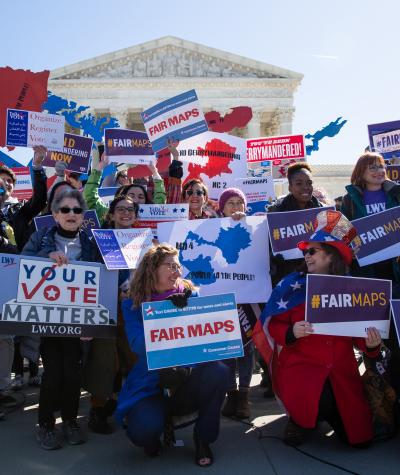Elections should be determined by voters, not politicians who draw maps that determine their voters.
On June 27, 2019, the U.S. Supreme Court ruled that federal courts may not intervene to block partisan election maps, no matter how unfair they may be. While the U.S. Supreme Court failed to put an end to partisan gerrymandering, something a growing number of Americans oppose, the fight for fair maps is still not over.
Campaign Legal Center (CLC), the Southern Coalition for Social Justice (SCSJ), and University of Chicago Professor Nicholas Stephanopoulos represented the League of Women Voters of North Carolina and 12 individual North Carolina plaintiffs in this case.
The decision is a setback in the fight for fair maps around the country. While we are disappointed that North Carolina voters will continue to vote in districts that were shown at trial to be severely biased, the fight is far from over. Now is the time to redouble efforts outside the courtroom to keep advancing solutions that put the voices of voters first.
As a growing number of citizens have become aware of partisan gerrymandering, voters have turned to independent redistricting commissions, like those passed in Colorado, Michigan, Missouri, and Utah in 2018. These commissions help ensure that maps are as fair and transparent as possible.
We are already working with over a dozen states, including Virginia, Pennsylvania, Illinois, Arkansas, and Minnesota to help them reform the rules of redistricting to reduce or remove partisanship from the process and promote transparency and accountability in the redistricting process.
We also intend to expand our litigation strategy to include state court cases, like the successful case from Pennsylvania in 2016, to strike down extreme gerrymanders that are enacted. This work at the state level becomes even more critical now that we know there can be no recourse to the federal judiciary to police partisan gerrymandering.
State courts also have the power to help improve the redistricting process so that each vote is counted equally. We saw this in Pennsylvania where the courts appointed a special counsel to draw fair maps.
Congress has the power to establish fair redistricting principles as well. H.R. 1: For the People Act includes parameters for fair redistricting and would take the necessary steps to help end partisan gerrymandering throughout the country.
CLC will continue to support efforts to mitigate the harms of partisan gerrymandering through a more independent map drawing process. Learn more about the movement to establish citizen-led redistricting commissions in the states.
Watch and share CLC's video highlighting the stories of voters whose voices were silenced in North Carolina by self-interested politicians.
Paul Smith, vice president at CLC, served as counsel of record in Rucho v. League of Women Voters of N.C.
This post was written by Aaron Carrell, a 2019 CLC Hinckley intern, and student at the University of Utah.
